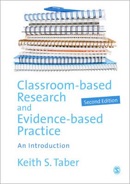Educational Research Methods

A site to support teaching and learning...
The following text is part of a vignette taken from a master’s research thesis (Taber, 1989).
This is a personal site of Keith S. Taber to support teaching of educational research methods.
(Dr Keith Taber is Professor of Science Education at the University of Cambridge.)
2017
Gill: A vignette
(The "typical" female pupil's experience of physics at the enquiry school, in comparison to a "typical" male peer.)
Options at 14+
By the time she reaches decision time for 14+ options in the third year Gill may have come to feel that physics is viewed as a boys' subject. If Gill and Barry are given a choice of separate science subjects then Gill is much more likely to choose biology, somewhat less likely to choose chemistry, and much less likely to choose physics compared to Barry. Gill may choose to study physics if she enjoys the subject but is quite likely to consider that biology is more interesting than physics and less difficult than chemistry. Some of her teachers may feel that Gill's overall choice of G.C.S.E. subjects does not follow her interests closely enough, but is influenced too strongly by the desire for a financially rewarding job.
Science 14-16
Although Gill will continue to find that boys try and dominate some science classes, she may be able to succeed academically without drawing attention to herself in lessons, and thus avoid ridicule from those of her male peers who do not like girls to seem to be doing well,.tical work she may display less confidence in undertaking experiments than Barry, although his more incautious approach need not be more effective (p .)
During the fourth year Gill and Barry are equally likely to aspire to A level study when they finish their G.C.S.E. studies. At this stage Gill is more likely to be considering physics as an option for A level study if she is following a broad and balanced science course, than if she is taking one or more of the separate sciences. Gill is quite likely to be unhappy with at least some aspects of the advice she receives concerning options and careers. She may well feel that the placement made for her compulsory work experience is not suitable for her own needs and aspirations. Whatever science subject(s) Gill and Barry take they can typically expect to achieve grades of about D or E at G.C.S.E. level. If Gill takes physics she may well be in the two-fifths of girl physics takers who achieve a grade C or above in the subject each year.
Comment on the ethics of this type of research writing

